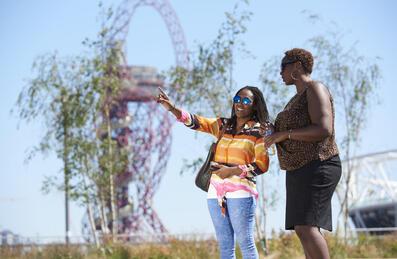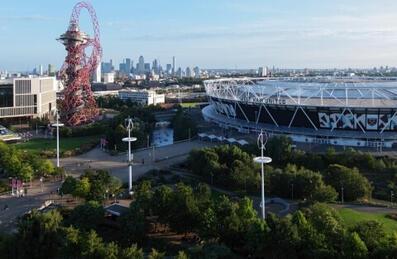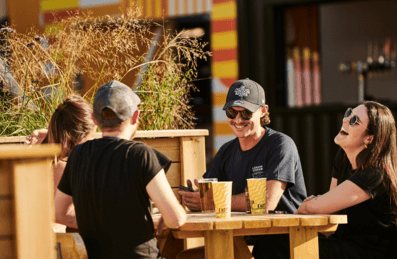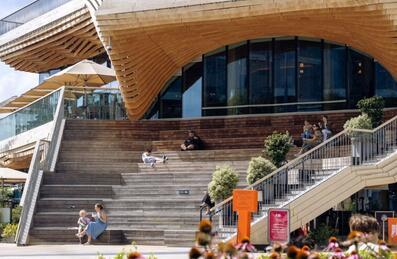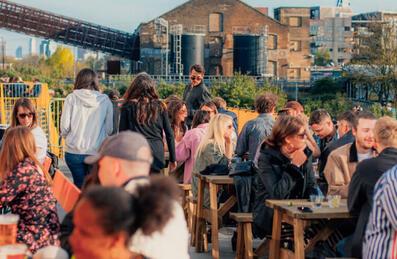
Popular Searches:
Keep up to date
Sign up today for exclusive offers and incredible experiences you won’t want to miss at Queen Elizabeth Olympic Park.
Sign up nowNature is important but fragile - LLDC has a key role to play
Nature is important but fragile - LLDC has a key role to play
Story 24/07/2024
Ben Coulter, LLDC Head of Sustainability, writes that Queen Elizabeth Olympic Park allows people to reconnect with nature and how the site of the London 2012 Olympic and Paralympic Games can help in the response to the climate emergency.
Charles Darwin told us that nature is constantly evolving. David Attenborough shows us the wonder of natural world, and its perilous state due to human impact.
Human nature is to see our flora fauna and fungi as something other than us. Something which gets either bulldozed or conserved.
People refer to themselves as “nature lovers” or not. Our modern urban lifestyles compound this sense of detachment from nature, and hot on the heels of detachment comes apathy, and the basis for a society which undervalues our connection with nature.
We need these reminders if we’re to value nature - to slow and reverse the trend of environmental degradation. Each generation starts from a lower baseline of natural richness, having to look to history to see what’s changed. Vera Lynn gave wartime Britain “A Nightingale Sang in Berkeley Square”. Anyone over the age of 40 will remember having to stop at service stations to clean countless splatted insects from car windscreens. Four distinct seasons of weather seems a thing of the past when every other month is announced as the hottest, wettest or driest on record.
The challenge of reversing this trend can seem insurmountable, and human nature nudges us towards thinking it’s somebody else’s problem to solve. The question to ask is “What can we do on our patch?”. At Queen Elizabeth Olympic Park, we’ve set out to show the value of our natural systems and what we can do to conserve and restore them.
So, what can we do to reconnect with nature and why is Queen Elizabeth Olympic Park an important part of this opportunity for our communities?
The Park offers anyone (at any time) a chance to connect with nature in an otherwise heavily urbanised area. Rustling leaves, glinting water and lilting bird song transport us from our computers and phones to remind us that we too are part of nature, precariously balanced on a little, blue planetary dot.
In addition to the emblematic stars of the Park’s wildlife (peregrine falcons, swallows, kingfishers, and an otter), nature supports our daily lives. Trees and plants are the lungs of our city, giving us clean air to breathe and have a calming influence. Pollinating insects carry the hope of future seasons’ growth. A stable climate allows our economy to function. Sustainability is nothing more or less than permitting future generations to flourish.
In 2012, London delivered the greenest Olympic and Paralympic games the world had seen. Queen Elizabeth Olympic Park continues this legacy, updated to meet the challenges we face today. We have a proud history of managing the Park for nature, and our Biodiversity Action Plan (BAP) summarises our progress towards achieving our biodiversity aims and objectives. It underpins our strategy to maintain and enhance biodiversity on the Park, as well as reflecting the evolving Park and changing climate.
What next for the Park and communities?
We’ve seen a lot of change since Queen Elizabeth Olympic Park opened to the public in 2013. Through lockdowns and heatwaves, the Park has afforded its visitors space to breathe and move, enjoying the rhythmic continuity that nature affords.
Change also means we need to look not just at the Park today, but to consider what the future holds. This includes preparing for changes in the climate and playing our part in responding to the climate emergency.
We’re committed to supporting the delivery of the Mayor of London’s vision of a net zero carbon capital. LLDC’s Climate Action Strategy, which can be viewed here, summarises progress towards our carbon reduction targets, and work to improve the resilience of the Park to a changing climate. Society increasingly understands our sustainability challenges, has the technology to meet them and an opportunity to do so. These are global issues, but connection to the natural world starts locally - something in which the Park can play a vital role.
So, here’s an invitation to (re)connect with the Park’s nature: join our “bioblitz” on 27 July. Consider also joining the Park’s volunteers: https://ourparklife.co.uk/volunteering/. Or simply visit the Park and marvel at the aerobatic display of our summer visitors - the swallows, swifts and martins - and renew your connection with nature by surrounding yourself with the wonderful trees, flowers, and plants.


